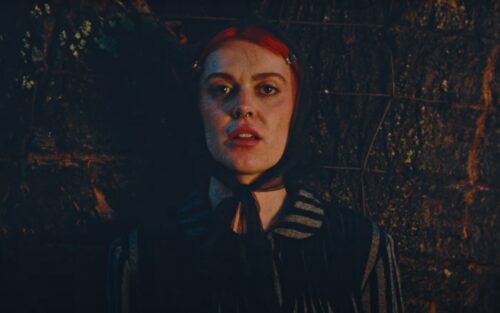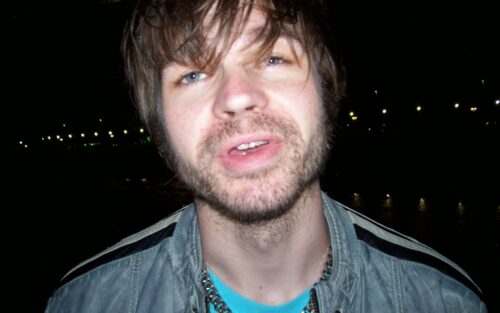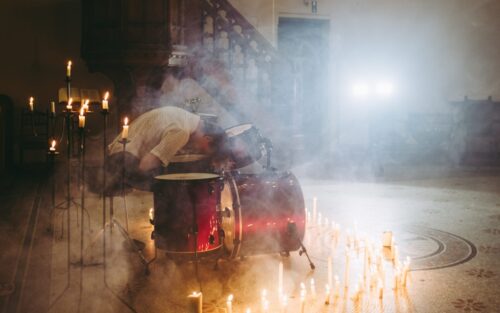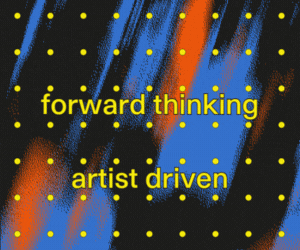Charlotte Day Wilson’s Blue Period
The genre-fluid artist plays with time, colour, and hockey sticks for her sophomore album.
By Sierra Riley
Photo by Emily Lipson
- Published on
I glimpse a copy of Maggie Nelson’s Bluets just over her shoulder. “That book has always felt like a reminder to me that once you choose a lens through which to see the world, you can find connection easily,” she explains. “It can be as simple as seeing a colour and feeling connected to your surroundings. […] I was feeling that way when I was working on the album. I had a bit of synesthesia. The musical decisions were all blue-green for me. I wanted to build that into the album title so that people could know, going into it, the world that I was picturing.”
Day Wilson may conjure colour in her music, but the central theme for this album was largely borne of a desire to be part of the growing cultural canon of blue. From Pablo Picasso to Joni Mitchell, legendary artists of all disciplines have phased through their own Blue periods. Though these have typically been associated with melancholy, Day Wilson assures me she wasn’t feeling down when recording the album—blue reminds her more of the sky, and “the sky is a very hopeful thing.” Cyan Blue (a title that references the singer’s blue-green eyes) comes as a result of joy-based collaboration.
“The thing I just want to assert, and it’s not necessarily an interesting or profound thing to say, is I just truly had fun making this album with my friend, Jack.” She here refers to producer Jack Rochon, who recently worked on Beyoncé’s Cowboy Carter and was a key player in the creation of Cyan Blue. She grins as she lists off his credits and accomplishments. “He deserves it more than anyone.”
Despite its happy creation story, the album isn’t without CDW’s characteristically haunting vocals and devastating lyrics about queer yearning. Like the artist behind it, Cyan Blue contains multitudes. The artist reaches out to her younger self through sound, chronicling myriad moments and relationships of her life. “I’m a very nostalgic person—also sometimes memories are really painful—but I can’t escape wanting to somehow impart wisdom on those versions of myself, from past or future,” she muses.


Day Wilson bends the cumulative 40-some minutes of Cyan Blue’s runtime into a continuum of her own. Tracks contain smooth melodies, surprising electronics, distortive voice mods, and elusive time passages. She jumps from wistful to angry, from now to then, from R&B to gospel and back again. She rekindles old flames in “Dovetail,” imagines possible realities in “New Day,” stretches out years like putty in “Forever,” speeds up a vocal sample in “I Don’t Love You,” and presses rewind in a velvety cover of “Over The Rainbow.” Blue passes through every song like water, the titular hue referenced lyrically and sonically to build a narrative arc that accelerates at its rapids and slows at its riverbends.
“You’ll be okay, just walk and don’t hurry,” she croons in the final track. Day Wilson isn’t rushing into her next era, nor does she have a clear picture of what it might look like. “It’s all pretty unknown to me, but I have loose threads that I can feel are slowly going to start braiding themselves together,” the singer tells RANGE. “But I do really think women’s sports, aside from music, is something I’m realizing I want to be more involved in.”
In her music video for “Canopy,” the Toronto singer can be seen shooting pucks into a net, skating in circles on ice over a layer of her own vocals. The black-and-white visual was inspired by her burgeoning passion for sport. “I stigmatized being athletic in my own mind. I didn’t realize it could actually be beautiful, and I just hid it for a long time,” she says. Since shedding the internalized patriarchal ideals that formed this belief, Day Wilson has consciously leaned more into that facet of her identity. “I was like, ‘Is it palatable to be a strong, sturdy woman who plays sports?’ […] But now, I’m just like ‘Hell yeah, fuck it, let me do this, too.’”
Is she an R&B singer or a producer? A hockey player or a WNBA fan? An alpha lesbian or a dependable friend? A collaborator or a solo performer? Is she green or blue? Charlotte Day Wilson is all of the above.
By Stephan Boissonneault
Nate Amos revisits a decade of stray ideas and turns them into his most compelling record yet.
By Khagan Aslanov
Mike Wallace’s electro-punk project premieres the hypnotic, percussion-driven video for "Certain Days."











